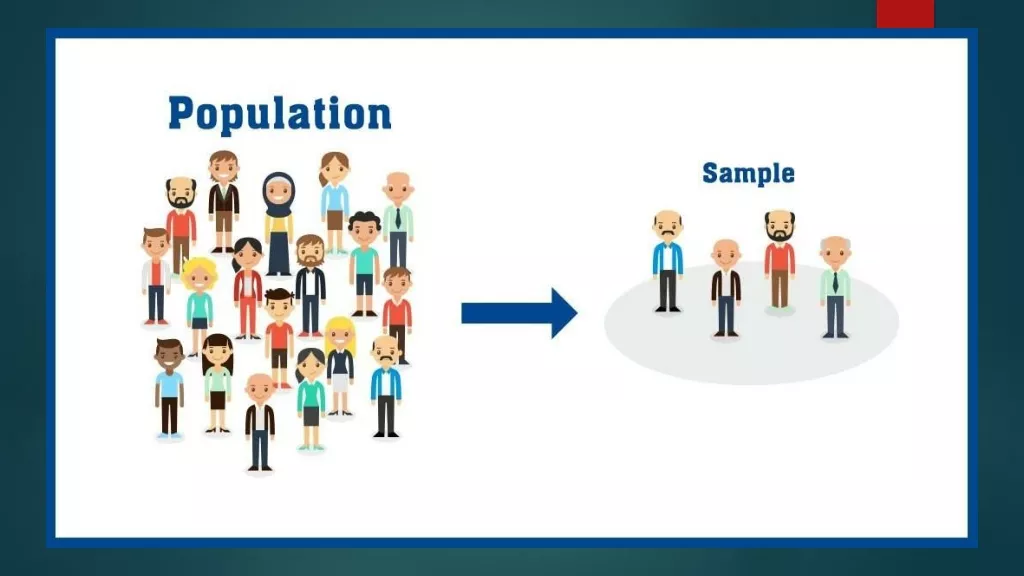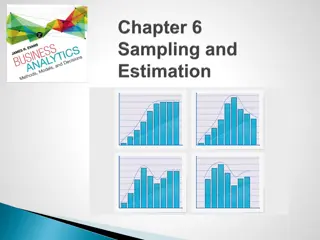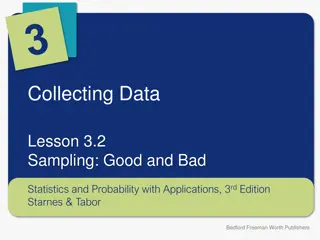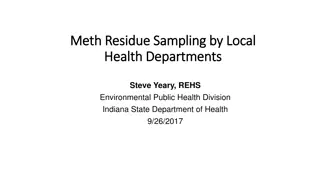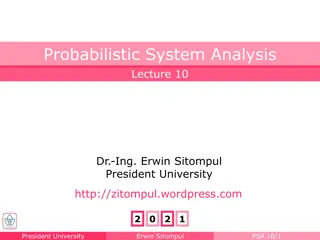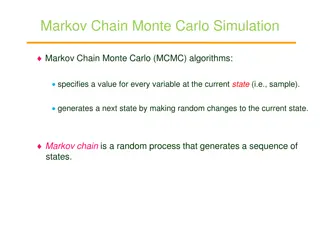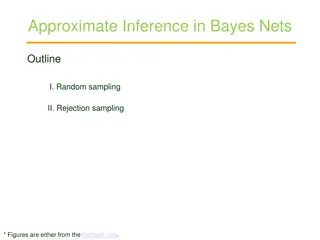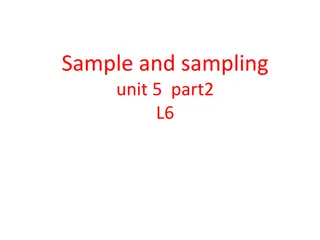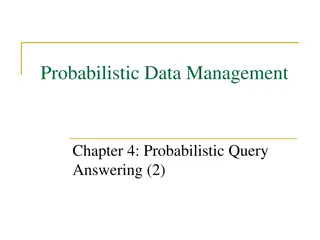Sampling Methods in Statistical Analysis
Sampling is a crucial process in statistical analysis where observations are taken from a larger population. Different sampling techniques are used based on the analysis being performed. Sampling methods help in studying populations when studying the entire population is not feasible. There are two
4 views • 8 slides
Sampling Under the RRF - General Principles and Methods
Sampling under the RRF is essential for the Commission to ensure reasonable assurance of fulfillment of numerical milestones or targets. The approach involves statistical risk-based random sampling with specific thresholds and considerations for different types of milestones. Various statistical tab
1 views • 12 slides
Non-Probability Sampling Methods
Non-probability sampling methods involve selecting samples based on subjective judgment rather than random selection. Types include convenience sampling, quota sampling, judgmental (purposive) sampling, and snowball sampling. Convenience sampling picks easily available samples, quota sampling select
5 views • 7 slides
Sampling Plans in Statistical Analysis
Sampling is vital for statistical analysis, with sampling plans detailing objectives, target populations, operational procedures, and statistical tools. Different sampling methods like judgmental, convenience, and probabilistic sampling are used to select samples. Estimation involves assessing unkno
2 views • 36 slides
Sampling Methods and Errors in Research
Sampling is crucial in research to draw conclusions about a population. Various methods like simple random sampling, stratified sampling, and systematic sampling help in selecting representative samples. Sampling error arises due to differences between sample and population values, while bias leads
9 views • 12 slides
Biases in Sampling Methods
Statistical studies rely on samples to draw conclusions about populations, but the method of sampling can introduce biases. This text discusses convenience sampling, voluntary response sampling, random sampling, and the implications of biased sampling methods on study results. It highlights how bias
2 views • 12 slides
Lead Dust Wipe Sampling Techniques and Guidelines
This resource provides valuable information on lead dust wipe sampling techniques for Lead Dust Sampling Technicians. It covers the objectives, measuring lead dust, sampling strategy, sampling locations based on EPA RRP Rule, and HUD clearance regulations. Techniques for taking dust wipe samples, id
6 views • 41 slides
Comprehensive Guidelines for Meth Residue Sampling by Local Health Departments
This detailed guide outlines the procedures and protocols for meth residue sampling conducted by local health departments. It covers the reasons for sampling, the importance of qualified inspectors, testing methodologies, sampling kits assembly, and more. Key points include when and why sampling is
5 views • 19 slides
Random Sampling in Probabilistic System Analysis
In the field of statistical inference, random sampling plays a crucial role in drawing conclusions about populations based on representative samples. This lecture by Dr. Erwin Sitompul at President University delves into the concepts of sampling distributions, unbiased sampling procedures, and impor
4 views • 23 slides
Sampling in Social Research Methods
Sampling in social research involves selecting a portion of a population to draw conclusions about the entire group. It helps save time, money, and allows for accurate measurements. The key principles of sampling include systematic selection, clear definition of sample units, independence of units,
4 views • 19 slides
Non-Probability Sampling Methods
Non-probability sampling involves selecting samples based on subjective judgment rather than random selection, leading to a lack of equal chances for all population members to participate. Various types include convenience sampling, quota sampling, judgmental sampling, and snowball sampling. Conveni
4 views • 7 slides
MCMC Algorithms and Gibbs Sampling in Markov Chain Monte Carlo Simulations
Markov Chain Monte Carlo (MCMC) algorithms play a crucial role in generating sequences of states for various applications. One popular MCMC method, Gibbs Sampling, is particularly useful for Bayesian networks, allowing the random sampling of variables based on probability distributions. This process
1 views • 7 slides
Approximate Inference in Bayes Nets: Random vs. Rejection Sampling
Approximate inference methods in Bayes nets, such as random and rejection sampling, utilize Monte Carlo algorithms for stochastic sampling to estimate complex probabilities. Random sampling involves sampling in topological order, while rejection sampling generates samples from hard-to-sample distrib
3 views • 9 slides
Non-Probability Sampling Methods
Non-probability sampling involves selecting samples based on subjective judgement rather than random selection. This method may not give all population members an equal chance to participate. Types include convenience sampling, quota sampling, judgemental sampling, and snowball sampling.
2 views • 7 slides
Non-Probability Sampling Techniques in Nursing Research
Non-probability sampling in nursing research involves selecting samples subjectively rather than randomly. This sampling method carries a higher risk of bias and limits statistical inference about the entire population. Five main types include convenience, purposive, quota, snowball, and voluntary r
7 views • 30 slides
Benefits of Probabilistic Static Analysis for Improving Program Analysis
Probabilistic static analysis offers a novel approach to enhancing the accuracy and usefulness of program analysis results. By introducing probabilistic treatment in static analysis, uncertainties and imprecisions can be addressed, leading to more interpretable and actionable outcomes. This methodol
4 views • 11 slides
Sampling: Importance, Process, and Errors Explained
This content delves into the world of sampling, exploring why sampling is crucial, the sampling process involving defining populations and calculating sample sizes, and the distinction between non-sampling and sampling errors. It covers the significance of representative samples, common errors in sa
3 views • 15 slides
Probabilistic Query Answering and Group Nearest Neighbor Queries
This chapter delves into probabilistic query types, focusing on probabilistic group nearest neighbor queries. Explore the definitions, processing techniques, and applications of such queries. Learn how probabilistic data management plays a crucial role in uncertain databases, spatial queries, and mo
2 views • 34 slides
Sampling and Surveys: Understanding Population and Sample
In statistics, understanding the population and sample is crucial. Learn about different sampling methods, such as voluntary response and convenience sampling, and how they can introduce bias. Explore techniques like simple random sampling, stratified random sampling, and cluster sampling. Discover
4 views • 54 slides
Unsupervised Learning of Probabilistic Grammars
In the Artificial Intelligence Research Laboratory at Iowa State University, researchers study the utility of curricula in unsupervised learning of probabilistic grammars. They explore grammar learning with a curriculum, the incremental construction hypothesis, and provide theoretical analysis suppo
1 views • 29 slides
Probabilistic Database Model
This research explores the development of a temporal-probabilistic database model to handle uncertain temporal facts obtained from information extraction methods. Motivated by the need for scalable query engines and a lack of unified approaches supporting both time and probability aspects, the study
3 views • 21 slides
Overview of Sampling Methods in Markov Chain Monte Carlo
This content covers various sampling methods in Markov Chain Monte Carlo including Rejection Sampling, Importance Sampling, and MCMC Sampling. It delves into representing distributions, drawbacks of Importance Sampling, and the motivation behind Markov Chain Monte Carlo Sampling. The illustrations p
0 views • 25 slides
Sampling Technique For Quantitative Data Presentation
This presentation focuses on sampling techniques for quantitative data collection in research studies. It covers concepts such as population, sample, sampling frame, types of sampling, and non-probability sampling methods. Dr. Aniket Shukla presents the importance of rigorous sampling plans to avoid
5 views • 17 slides
Probabilistic Annotation Framework: Knowledge Assembly at Scale with Semantic and Probabilistic Techniques
This content discusses the development of a probabilistic annotation framework for knowledge assembly at scale using semantic and probabilistic techniques. It also touches upon the Big Mechanism research program aiming to integrate cancer research papers into a big cancer model to frame new hypothes
2 views • 22 slides
Fundamental Sampling Distributions and Random Sampling in Statistical Analysis
In statistical analysis, understanding fundamental sampling distributions and random sampling is crucial for making accurate inferences about populations. Sampling involves selecting a subset from a population to draw conclusions when observing the entire population is impractical. Random sampling h
2 views • 23 slides
Digital vs Analog Signal Conversion: Sampling, Quantizing, Coding
Discover the process of converting analog signals to digital using techniques like sampling, quantizing, and coding. Learn how sampling ensures accurate representation of analog signals in the digital realm, adhering to the sampling theorem for optimal signal reconstruction. Explore various sampling
1 views • 26 slides
Neural Network Probabilistic Properties and Testing
Explore how to check probabilistic properties of neural networks using symbolic methods and sampling, discussing specifications, testing, verification, and the importance of probabilistic expressions in ensuring correctness. Discover the significance of probabilistic specifications, training process
1 views • 18 slides
Industrial Engineering Sampling Methods Overview
Learn about different sampling methods used in industrial engineering, including probability sampling (such as simple random sampling, stratified sampling, cluster sampling) and non-probability sampling (like volunteer and judgmental sampling). Understand the principles behind simple random sampling
5 views • 17 slides
Sampling Techniques for Quantitative Data in Health Research
This presentation discusses sampling techniques for quantitative data in health research, covering topics such as sample representativeness, sample frame, and types of sampling methods. It explains the importance of having a rigorous sampling plan to avoid biased estimates in research studies. The d
2 views • 17 slides
Sampling Methods for Population Studies
Learn about the challenges of studying entire populations and how sampling methods such as random and non-random sampling help generalize findings effectively. Explore probability and non-probability sampling techniques, including simple random sampling and systematic random sampling.
4 views • 13 slides
Sampling Methods in Statistics and Research
Learn about the different types of sampling methods in statistics and research, including purposive sampling, random sampling, stratified sampling, and more. Explore how sampling techniques are used to estimate characteristics of a population, with examples and explanations provided.
4 views • 11 slides
Probabilistic Query Answering in Data Management
Explore the definitions of various probabilistic query types and the representation and querying of correlated tuples in probabilistic databases. This chapter delves into the realm of uncertain and imprecise data, focusing on correlations and functional dependencies commonly found in sensor networks
0 views • 42 slides
Sampling Methods in Statistical Analysis
Sampling is a crucial process in statistical analysis where observations are taken from a larger population to draw valid conclusions. Understanding the population, sample, and sampling frame is essential in research to ensure representativeness and validity of results. Defining the target populatio
0 views • 9 slides
Efficient Coding Theorem via Probabilistic Representations
Explore the Efficient Coding Theorem through Probabilistic Representations and its applications in algorithms and complexity. Discover the pillars of Kolmogorov Complexity and the time-bounded version. Learn about efficiently samplable objects and their short probabilistic representations. Applicati
0 views • 7 slides
Understanding Sampling Techniques in Research Studies
Learn about different types of sampling methods including non-probability and probability sampling techniques such as simple random sample, systematic random sample, stratified random sampling, and cluster sampling. Explore why sampling is crucial in research, and how it helps in saving time and cos
0 views • 8 slides
Sampling Methods in Statistics and Probability
Explore the importance of sampling methods in statistical studies, focusing on convenience sampling, voluntary response sampling, and random sampling. Understand how each method can lead to bias and learn how random sampling helps avoid bias in collecting data to make accurate conclusions about popu
1 views • 8 slides
Efficient Sampling Methods in Statistics
Explore various sampling methods in statistics like simple random sampling, systematic sampling, probability vs. non-probability sampling, and techniques to determine sample size using Cochran's and Yamani's formulas. Learn how to implement sampling in R for data analysis.
0 views • 21 slides
Understanding Sampling Methods and Biases in Statistics
Learn about representative populations, different types of sampling biases, and various sampling methods like judgmental sampling, voluntary sampling, and stratified random sampling. Discover how biases can impact the accuracy of research outcomes and understand the importance of selecting samples i
1 views • 17 slides
Probabilistic Reasoning and Sampling Methods in Artificial Intelligence
Explore probabilistic reasoning and sampling methods in artificial intelligence, focusing on approximate inference, Bayes nets, and the law of large numbers. Learn how to leverage sampling for posterior probability estimation and most likely explanations in large networks.
2 views • 33 slides
Understanding Non-Probability Sampling Methods
Explore the world of non-probability sampling techniques, including convenience sampling, quota sampling, judgemental sampling, and snowball sampling. Learn how researchers select samples based on subjective judgement rather than random selection, impacting data collection and analysis.
1 views • 7 slides
